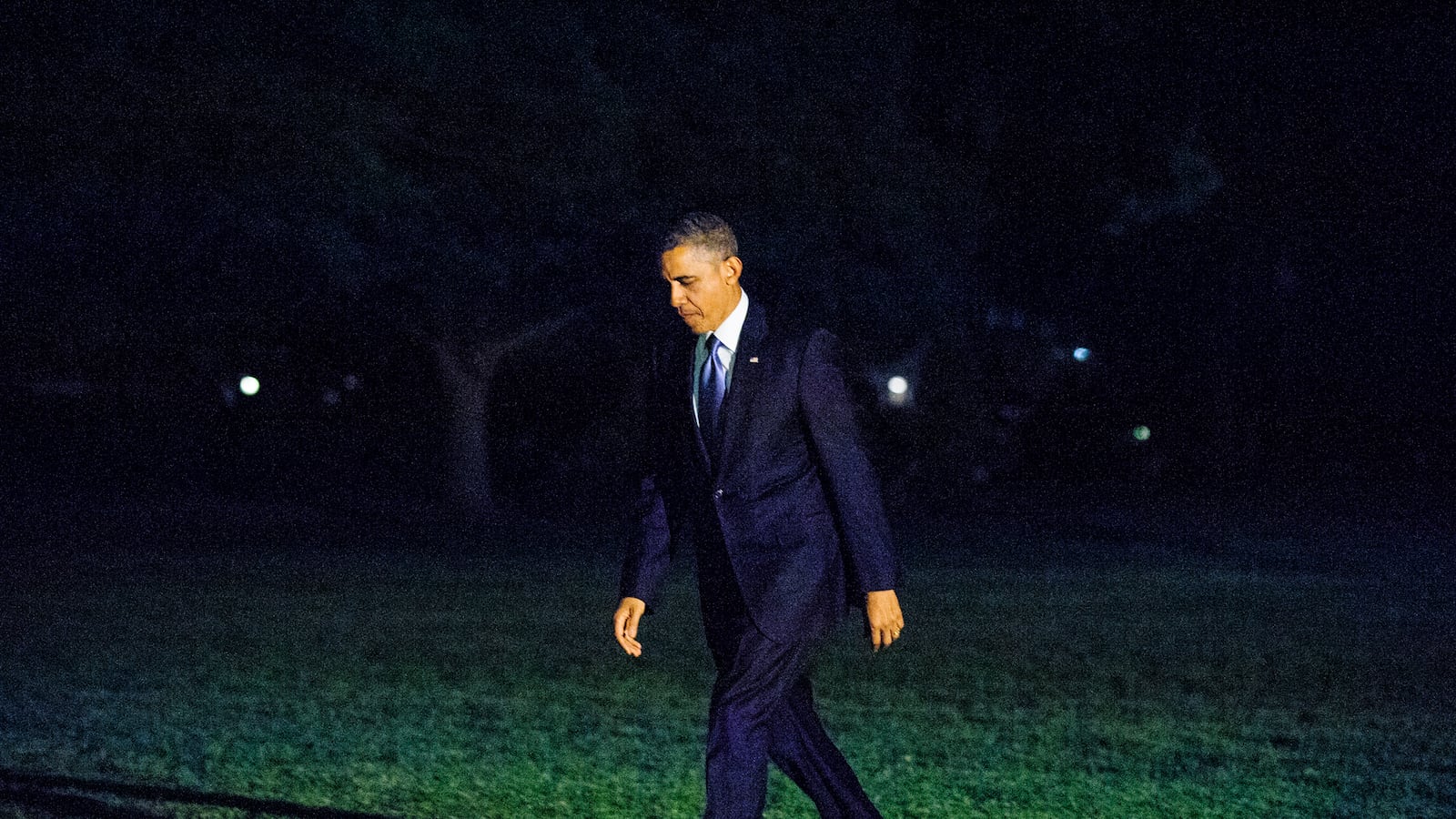The way Washington reporting works, much of it revolves around the White House and the perception that the leader of the free world should be controlling most everything that’s worth paying attention to. President Obama is not following the script, and it was left to his press secretary, former reporter Jay Carney, to explain to a packed briefing room Tuesday why Obama is not taking a more forceful stance to combat the scandals—including one that reporters take very personally—engulfing his presidency. An AP reporter set the tone with the first question, ticking off the controversies now swirling around the White House and declaring that “in every instance the president places the blame someplace else”—Benghazi on Republicans, the IRS targeting conservative groups on bureaucrats, and snooping on journalists’ phone records on the Justice Department.

Carney did a good job disentangling the various strands, and Benghazi seems to be losing steam with a CNN report that one leaked email was misrepresented, bolstering Obama’s claim that the GOP investigation has become a media circus. On the IRS, Carney said repeatedly that the White House is waiting for the Treasury Department’s Inspector General’s report, which dropped Tuesday evening, before discussing the particulars of what went on. When a reporter asked Carney, “Can you say categorically no one in the White House was involved in any way in the targeting of Tea Party groups?” he responded unhesitatingly, “Yes.” But when another reporter pressed him on how he knew that, and whether he had any facts to back up his assertion, Carney retreated, embroidered his yes with some qualifiers, and protested, “You’re asking me to prove a negative.”
On Justice collecting AP phone records, and only after the fact informing the news wire that it had done so, Carney said the department operates independently and that Obama first learned of the intrusion into First Amendment freedoms when he was traveling to New York on Monday for two political fundraising events. This administration has prosecuted twice as many leak cases as all previous presidents combined, so a tone is set at the top, but Obama can’t interfere in an ongoing criminal investigation. If he did, the Republicans might have a truly impeachable offense. “What prevents the president from calling up Eric Holder and asking what’s going on?” the reporter from Fox asked. “A lot,” Carney responded. “Imagine the story on Fox if that were to happen, that’s what…”
Carney seemed genuinely pained by the Justice Department’s action with regard to the media. A former Washington bureau chief for Time magazine, and knowing the chilling effect an administration’s actions can have, Carney sought to broaden the picture of Obama as someone who in the Senate supported a media shield law, and as president reiterated that support in a letter to Congress in 2009. The legislation was killed by Republicans, Carney noted. But when Jake Tapper of CNN pointed out that Democrats controlled Congress then, Carney seemed flummoxed. Concerns about national security have made Obama the toughest of any recent president in cracking down on leaks, a policy that his attorney general has pursued. Holder announced Tuesday he had recused himself from the AP leak investigation because the FBI had interviewed him about it, and that a deputy AG had taken the extraordinary step of delving into the AP’s phone logs.
Would heads roll? “The president has confidence in the Attorney General, and he has confidence in his team over at Justice,” Carney said. Obama is a constitutional lawyer. What does he think of these tensions over First Amendment freedoms? “You’re free to ask him the next time he has a press conference,” Carney said, a response that drew a ripple of laughter from the assembled reporters.
The picture that comes through of Obama is that of a leader buffeted by all these forces outside his control, at the mercy of a runaway administration. “Is there a siege mentality back there in the West Wing?” a reporter asked. “I understand the natural inclination to lump these things together,” Carney said, responding with measured cadence that the business of government continues. “There’s a lot of work to be done, and he’s focused on that work.”
A White House is a pressure cooker on even the best days, and these last several days have tested the president, and his spokesman. Former White House press secretary Mike McCurry was out giving a speech Tuesday while Carney was behind the podium, so he didn’t see the briefing. “Be glad you’re not Jay Carney,” someone told him. “There are weeks like this at the White House from time to time,” McCurry told The Daily Beast. “You just have to wait for the sun to come back out.” In the 24-7 news cycle, everything has to be instantaneous, but there’s a bright spot, says McCurry: it’s impossible for Washington to focus on three scandals at the same time, and in the velocity of today’s media coverage, “everything blows over.”
Still, it’s dizzying to realize this is just four months into Obama’s second term, after a historic reelection and a bigger margin of victory than anyone expected. McCurry offers some historical perspective, recalling how in 1997, after Clinton was handily reelected, the White House was engulfed by a campaign-finance scandal. Hardly anyone remembers that now, and it helped that the business of government continued despite contentious White House briefings focused on questionable fundraising practices. The scandal didn’t stop then chief of staff Leon Panetta, Clinton, and House Speaker Newt Gingrich from negotiating a balanced budget. Obama’s situation is worsened by a sense that there’s no progress being made in governing.
McCurry went on to face a press corps covering the Monica Lewinsky scandal, and he managed to keep his cool, and his credibility, which is Carney’s challenge today. “There’s a belief in the press that there’s a truth closet in the White House, turn the key and it all tumbles out,” says McCurry. “If you want to get it accurate, it’s a painstaking process.”





